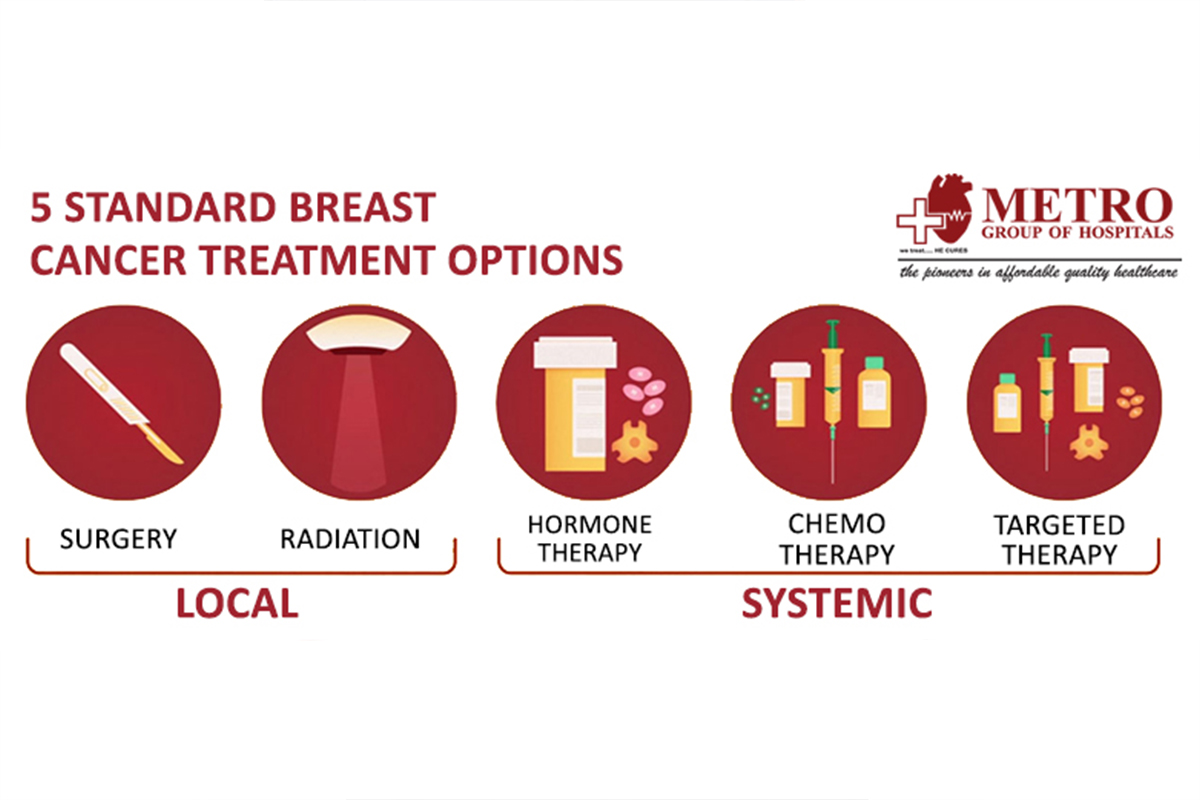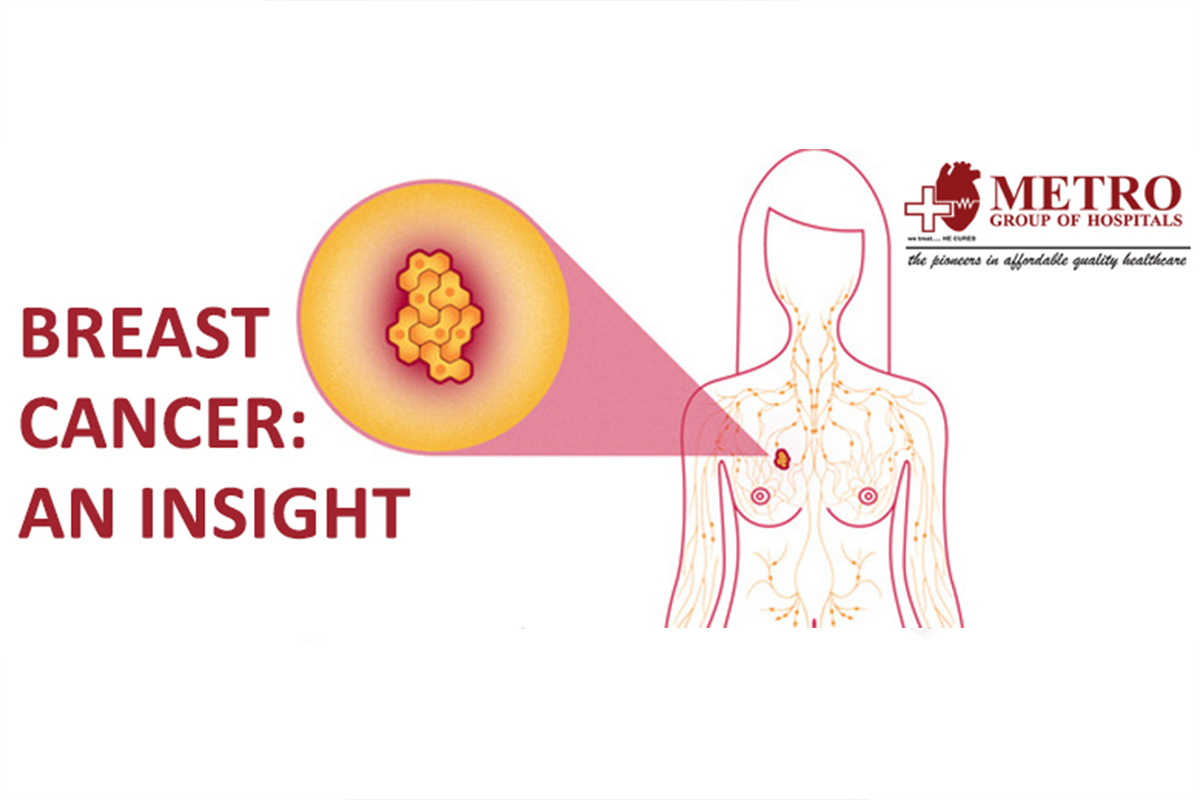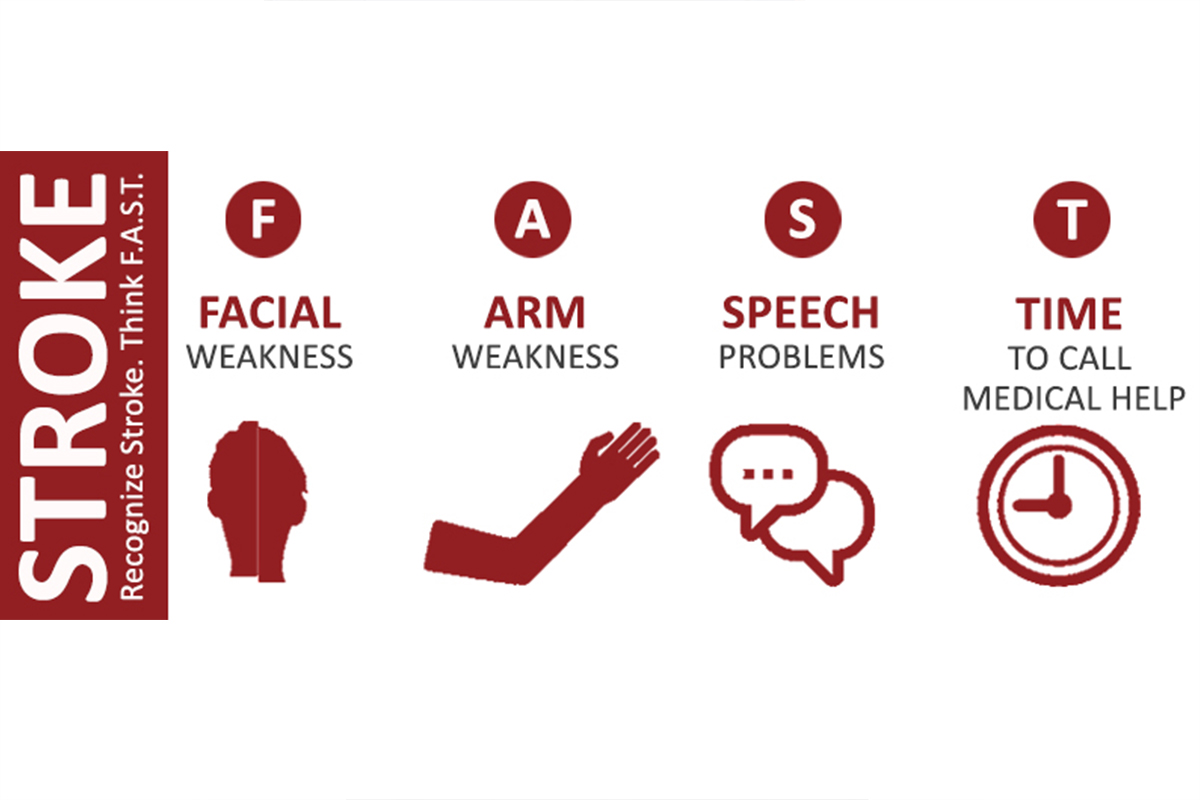
Approach To Breast Cancer / Lump And Treatment For Breast Cancer
By in Cancer Surgical Oncology
Oct 31, 2017
Introduction:
Breast Cancer is one of the most common types of cancer found in women all across the globe. Breast Cancer develops in the breast tissues. Formation of lump, change in the shape or size of the breast, discharge from the nipples, red patches around the skin of the breast or dimpling of skin, these all are the symptoms of the breast cancer. Apart from these symptoms there are certain symptoms also such as pain in the bone, swollen lymph nodes.
Approach to Breast Cancer / Lump:
Clinical examination and self examination of breast should be performed regularly. Majorly breast cancers get detected during mammography but for further evaluation to know whether the lump is cystic or solid, women need to go through ultrasonogarphy. Apart from physical examination, mammography and ultrasonogarphy there are other various methods for the detection of breast lump. They are:
- MRI of breast
- FNA – fine needle aspiration
- The final diagnosis of breast carcinoma requires a breast biopsy.
Treatment Of Breast Cancer Stages I-III
The stage of the breast cancer is one of the important factors in making the decision about the treatment method.
Majority of women suffering from breast cancer stages I, II or III are treated with surgery, followed by chemotherapy or radiations therapy. The treatment options are affected by the personal preferences and other information about the breast cancer, such as:
- If the cancer cells contain hormone receptors (it means, that if the cancer is ER-positive or PR-positive)
- If the cancer cells have large amount of the HER2 protein (it means, that if the cancer is HER2-positive)
- How fast the cell are growing (measured by grade or Ki-67)
- Overall health of the women
- Whether the woman has gone through her menopause or not
Surgery: For the treatment of breast cancer, surgery is considered as main treatment. Breast conserving surgery (BCS) or mastectomy is the surgical methods opted for the surgery. The nearby lymph nodes are also need to be checked, wither with sentinel lymph node biopsy (SLNB) or an axillary lymph node dissection (ALND).
In other cases, breast reconstruction is done at the same time of surgery to remove the cancer.
Radiation Therapy: If BCS has been performed, radiation therapy is usually given after the surgery to lower down the re-development of cancer cell in the breast. Women who are above the age of 70 years can consider BCS without going for radiation therapy only if:
- The tumor was 2 cm or less across and has been removed completely.
- None on the lymph nodes carry cancer cells.
- The cancer is ER-positive or PR-positive and hormone therapy has been given.
Stage I- At this stage the breast cancer are relatively small and have not spread to the lymph nodes or might have spread to a tiny area in the sentinel lymph node (the 1st lymph node to which cancer is likely to spread out).
Stage II- The size of the breast cancer is larger in stage II as compared to that of stage I. In this stage the cancer has already spread to a few nearby lymph nodes.
Stage III- At stage III the cancer size has increased that they have started growing into the nearby tissues (the kin over the breast or the muscle underneath) too much that they have spread to many nearby lymph nodes. Doctor consultation is important for the further treatment process as most women suffering from breast cancer goes through some kind of drug therapy as a part of their treatment. This process includes:
Hormone Target Therapy: hormone therapy (tamoxifen, an aromatase inhibitor, or one followed by the other). HER2 targeted drugs, such as trastuzumab (Herceptin) and pertuzumab (perjeta). These types of drugs might work best depending on the tumor’s hormone receptor status, HER2 status, and other factors.
Targeted Breast Cancer Therapy:
In target therapy treatment only the specific characteristics of cancer cells are treated, like proteins which are responsible for the rapid or abnormal growth of cancer cells. Targeted therapies are less harmful in comparison to chemotherapies, as in chemotherapies the normal and healthy cells along with cancer cells gets destroyed. Some targeted therapies work like antibodies, which are naturally developed by our immune system. At times these targeted therapies are also known as immune targeted therapies.
Pregnant women are not advised to undergo targeted therapies as these therapies are not safe during the pregnancy period.
Below are the lists of the targeted therapies that doctor use for the treatment of breast cancer:
Afinitor (the chemical name is everolimus): Afinitor is an mTOR (mammalian target of rapamycin) inhibitor. Afinitor works against the receptor positive breast cancer cells which have stopped responding to Arimidex or Femara. These inhibitor stops the cancer cells from getting the energy they need.
Avastin (the chemical name is bevacizumab): These work by blocking the growth of new blood vessels on which the cancer cells depend to grow and function.
Herceptin (the chemical name is trastuzumab): Herceptin works against HER2-postive breast cancers. They block the ability of the cancer cells for receiving the chemical signals that indicates the cells to grow.
Ibrance (the chemical name is palbociclib): Ibrance is a cyclin-dependent kinase 4/6 inhibitor. Inbrance works by stopping the cancer cells from further dividing and growing.
Kadcyla: (Chemical name- T-DM1 or ado-trastuzumab emtansine) Kadcyla is the combination of Herceptin and the chemotherapy medicine emtansine.
About us:
Metro Group of Hospitals has a dedicated 155 bedded facility, Metro Hospital and Cancer Institute, Preet Vihar, New Delhi, mainly dedicated for treatment of cancer. The hospital boasts of highly experienced team of medical, surgical, radiation, gynae oncologists and most advanced technology for 360 degree cancer treatment.
For more details or appointments call: +91 88001 97020 / metro@metrohospitals.com.







